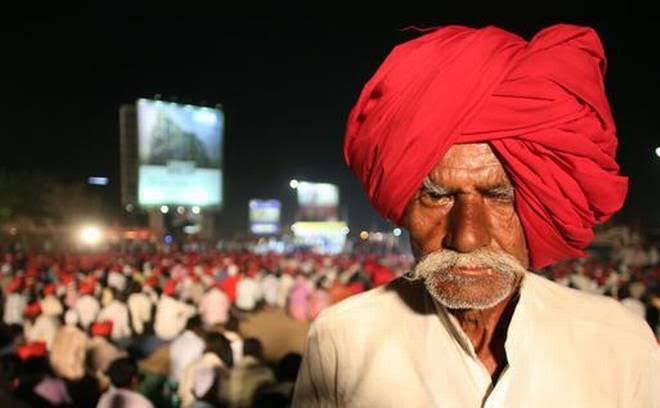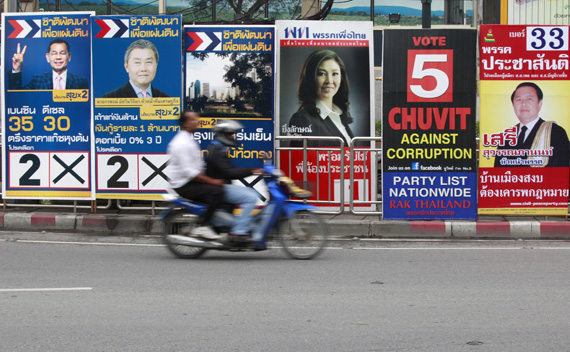India
The Farmer Strikes back
Lakhs of farmers to march in Delhi

All India Kisan Sangharsh Coordination Committee, which was formed last year by around 200 farmer's organizations spread across the country, coming together for 'securing farmers' rights', has called for a huge protest in Delhi on November 29 and 30. The protest termed ‘Kisan Mukti March’ and is expected to see thousands of farmers from all over the country assembling in the capital for demanding a special session of parliament for passing two bills formulated by the committee and to discuss the agrarian crisis.
The protest is also expected to see remarkable participation of other professionals and the usually indifferent middle class, in support of this march, solidarity groups like Students for Farmers, Doctors for Farmers, Lawyers for Farmers, Teachers for Farmers, Photographers for Farmers, Artists for Farmers, Techies for Farmers have been formed in various cities under the common platform of Nation for Farmers.

What are the demands?
The key demand of this Kisan Mukti March is to hold a special session of parliament to exclusively discuss the agrarian crisis and to pass two Kisan Mukti Bills. One of the bills is The Farmers' Freedom From Indebtedness Bill 2018 and the other is The Farmers' Right To Guaranteed Remunerative Minimum Support Prices For Agricultural Commodities Bill 2018.
The other important demand is to discuss the report of National Commission on Farmers, popularly know as Swaminathan commission, in that special session of parliament.
Renowned journalist P Sainath, who is working with Nation for Farmers to mobilise support for this march, said in an interview recorded for People's Archive of Rural India (PARI) that the report of Swaminathan commission, which was submitted to the parliament around fourteen years ago, has not been discussed in the parliament even for one hour. "This country could have a joint special session of parliament at midnight to pass the GST bill, but it could not find any time for its tens of millions of farmers in fourteen years", he said in the interview while talking about the demand for a special session of parliament.
The AIKSCC has also issued a two point charter of demands (http://aikscc.com/demands/) which calls for 'a whole gamut of new laws, policies, institutions and initiatives' in the long run to solve the agrarian crisis.
What are the two bills?
Chapter two of The Farmers' Freedom From Indebtedness Bill, drafted by the AIKSCC, has provision for 'right of farmers to recieve one time complete and immediate loan waiver'. The provision soughts to give every farmer in the country, an immediate and unconditional waiver of their entire amount of outstanding institutional debt at the time of implementation of the bill. Then it has provisions to ease flow of institutional credits to the farmers.
The bill provides for an institutional mechanism 'for providing debt relief for farmers affected by distress and natural disasters'. Chapter five of the bill has provision to establish a National Farmers’ Distress and Disaster Relief Commission which will be responsible for making recommendations to the government for declaring a district as 'a distress affected area' or a crop as 'a distress affected crop'. Such areas or crops will have to be provided debt relief.
The other bill drafted by AIKSCC, the Farmers’ Right to Guaranteed Remunerative Minimum Support Prices for Agricultural Commodities Bill is intended to provide for minimum of 50 per cent profit margin over 'the comprehensive cost of production' for all agricultural commodities.
The calculation of cost of production in this bill, has been made more comprehensive to include all
paid-out costs as well as imputed costs including family labour at skilled wage rates, rental value of land, interest on assets and remuneration calculated for managerial functions performed by the farm household etc. The bill also has a provision to establish an autonomous commission for making recommendations to the government on minimum guaranteed remunerative prices for all crops.
Both of these bills, after going through a process of discussion and deliberations, were fine-tuned and finalised along with senior leaders of various political parties on April 25th 2018.
What is different this time?
The AIKSCC claims that for the first time through this protest, farmers are trying to secure some statute based rights for themselves, as before this, no farmers’ movement in this country have attempted to do this unlike several other people’s movements.
Also the protest is not limited only to the farmers this time and support from other professionals like lawyers, doctors, artists, soldiers etc and the middle class have been mobilised through an informal forum called Nation for Farmers. "It's the time the middle class make themselves relevant to the lives and struggles of our farmers and farm labourers", said P Sainath in the interview on PARI. An appeal was made to the people of all sections of society through a website (dillchalo.in), to sign a petition urging the president to intervene and hold a special joint session of parliament.
The protest is taking place on the background of many smaller protests that occurred in last few years year in states like Maharashtra, Madhya Pradesh, Tamil Nadu and Uttar Pradesh.
What are the activities planned on November 29 and 30 ?
On the first day of march (November 29), farmers from all over the country, accompanied by their well wishers from other professions, will assemble at four different points around the capital city. The four gatherings will begin their march towards Ramleela maidan in the morning and are expected to reach at Ramleela maidan in the evening.
On the second day (November 30), the protesters will rally from Ramleela Maidan to Boat club. According to the estimate of AIKSCC, more than one lakh people will attend the rally. Many smaller marches and other activities have been planned in various cities throughout the country in the support of the Kisan Mukti March on both of these days.

For detailed and continous updates on the Kisan Mukti Morcha, follow Indie Journal's ground zero coverage from November 27.





